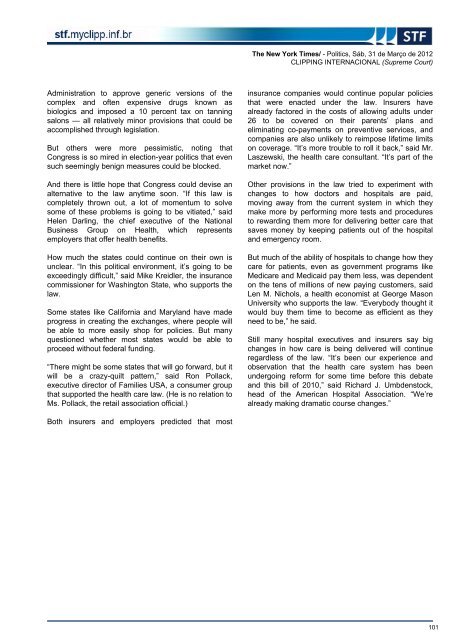STF na MÃdia - MyClipp
STF na MÃdia - MyClipp
STF na MÃdia - MyClipp
Create successful ePaper yourself
Turn your PDF publications into a flip-book with our unique Google optimized e-Paper software.
Administration to approve generic versions of the<br />
complex and often expensive drugs known as<br />
biologics and imposed a 10 percent tax on tanning<br />
salons — all relatively minor provisions that could be<br />
accomplished through legislation.<br />
But others were more pessimistic, noting that<br />
Congress is so mired in election-year politics that even<br />
such seemingly benign measures could be blocked.<br />
And there is little hope that Congress could devise an<br />
alter<strong>na</strong>tive to the law anytime soon. “If this law is<br />
completely thrown out, a lot of momentum to solve<br />
some of these problems is going to be vitiated,” said<br />
Helen Darling, the chief executive of the Natio<strong>na</strong>l<br />
Business Group on Health, which represents<br />
employers that offer health benefits.<br />
How much the states could continue on their own is<br />
unclear. “In this political environment, it’s going to be<br />
exceedingly difficult,” said Mike Kreidler, the insurance<br />
commissioner for Washington State, who supports the<br />
law.<br />
Some states like California and Maryland have made<br />
progress in creating the exchanges, where people will<br />
be able to more easily shop for policies. But many<br />
questioned whether most states would be able to<br />
proceed without federal funding.<br />
“There might be some states that will go forward, but it<br />
will be a crazy-quilt pattern,” said Ron Pollack,<br />
executive director of Families USA, a consumer group<br />
that supported the health care law. (He is no relation to<br />
Ms. Pollack, the retail association official.)<br />
Both insurers and employers predicted that most<br />
The New York Times/ - Politics, Sáb, 31 de Março de 2012<br />
CLIPPING INTERNACIONAL (Supreme Court)<br />
insurance companies would continue popular policies<br />
that were e<strong>na</strong>cted under the law. Insurers have<br />
already factored in the costs of allowing adults under<br />
26 to be covered on their parents’ plans and<br />
elimi<strong>na</strong>ting co-payments on preventive services, and<br />
companies are also unlikely to reimpose lifetime limits<br />
on coverage. “It’s more trouble to roll it back,” said Mr.<br />
Laszewski, the health care consultant. “It’s part of the<br />
market now.”<br />
Other provisions in the law tried to experiment with<br />
changes to how doctors and hospitals are paid,<br />
moving away from the current system in which they<br />
make more by performing more tests and procedures<br />
to rewarding them more for delivering better care that<br />
saves money by keeping patients out of the hospital<br />
and emergency room.<br />
But much of the ability of hospitals to change how they<br />
care for patients, even as government programs like<br />
Medicare and Medicaid pay them less, was dependent<br />
on the tens of millions of new paying customers, said<br />
Len M. Nichols, a health economist at George Mason<br />
University who supports the law. “Everybody thought it<br />
would buy them time to become as efficient as they<br />
need to be,” he said.<br />
Still many hospital executives and insurers say big<br />
changes in how care is being delivered will continue<br />
regardless of the law. “It’s been our experience and<br />
observation that the health care system has been<br />
undergoing reform for some time before this debate<br />
and this bill of 2010,” said Richard J. Umbdenstock,<br />
head of the American Hospital Association. “We’re<br />
already making dramatic course changes.”<br />
101











